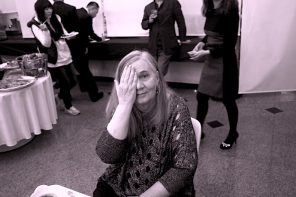Ten questions for Lisa Miller on
Heaven: Our Enduring Fascination
with the Afterlife (HarperCollins, 2010)
What inspired you to write Heaven?
About a year after 9/11, I wrote a Newsweek cover story on heaven. It was triggered by this idea: In a suicide bombing, everyone thinks they’re going to heaven. The bombers are martyrs, according to their beliefs, and are going to straight to heaven to receive the rewards promised there. The victims are martyrs, according to their beliefs, and are also going straight to heaven. So: which is it? Is everyone going to heaven? Is there a different heaven for terrorists and for the people killed by terrorists? This led to a very basic exploration of ideas of heaven: Heaven as a real place, heaven as an idea of something beautiful and perfect but unattainable, heaven as a location somewhere, heaven as a process, heaven as a galvanizing or corrupting influence or an incentive for good (what the Bible calls “righteous”) behavior.
As I dug deeper, I began to see that people have been asking the same questions about heaven since they started to talk about it. While they’re unanswerable, they’re also worth asking.
First, what does heaven look like? In Islam, it looks like a garden. In Christianity, it looks like a city—and a garden, too. The orthodox often see these descriptions as literal: Randy Alcorn, an evangelical Christian who has written a popular book on heaven for the conservative Christian audience, talks about heaven as a place like Boston, with museums, libraries, parks, and no litter or crime. It’s a busy place, he says. Progressives tend to see the scriptural descriptions—the pearl gates in the Book of Revelation, for example—as metaphorical. Thus, the Qur’an promises that in Paradise, there will be gardens, running water, and ripe fruits. The righteous will be clad in silk and recline on couches, ready to be waited on and to receive the attention of houris, dark-eyed women. We all know that Mohammad Atta, who flew American Airlines flight 11 into the Twin Towers on 9/11, was inspired by this promise. But among progressives, the sex promised to the righteous in the Qur’an isn’t sex as we know it, but something mysterious and sublime for which sex is a poetic stand-in.
Second, what happens to our bodies in heaven? This is my favorite part of the heaven conversation. For if you believe in heaven as a real place, a physical place (and most people do), then you need a body or something like a body with which to enjoy it. The critical verse here is 1 Corinthians 15, in which Paul explains to those who doubt the truth of the resurrection that the body is like a seed—and when it rises in the resurrection is both has the properties of a seed and of something else altogether. “What is sown is perishable, what is raised is imperishable… It is sown a physical body, it is raised a spiritual body.” Generations of Christians have tried to figure out what that “spiritual body” means. I am reminded of a conversation with Owen Gingerich, a Christian believer who is also an astrophysicist at Harvard. He puts the conundrum this way: Human bodies are characterized by change, and heaven, by tradition, is characterized by changelessness. How does that work? How does the human, who changes minutely every second, exist in a changeless eternity? The church father Augustine solves this by saying that in heaven time has no meaning, but that declaration doesn’t satisfy rational-minded people like me.
More to the point: With bodies in heaven, we can do all the things that bodies do. We can eat, drink, make love. We can hug our parents and walk our dogs. We can have all the pleasure that the Christian tradition promises us in heaven. Without bodies (which is how more and more Americans are inclined to imagine heaven these days) it’s hard to imagine having anything like consciousness or selfhood; or pleasure or friendship. Plato taught that the body was a curse, a drag; it carried all the baser human impulses and desires. After death, the soul was set free to ascend to God and attain wisdom. This vision may work better in a world defined by science and rationality, but it fails to trigger passion and imagination in the same way that a physical vision would.
Third, who’s up there and what do we do? Our most commonly held notion of heaven is that when we die, we’ll see our beloved parents, grandparents, spouses, friends. Our songs and our dearest hopes are built around this notion.
But as Colleen McDannell and Bernhard Lang point out in their wonderful book, Heaven: A History, this idea of a social, or domesticated heaven, is a relatively recent invention—an idea that really took root around the time of the Civil War. From the beginning, heaven was a place where people went to be with God. In Dante’s Paradiso, the blessed reside in different levels, but every person in each level is focused on one thing, God, and is thus perfectly content with her hierarchical place. Even if the ancients understood that they would see their relatives in heaven, they had no idea of hanging out with them, or doing any of the things that Susie Salmon does in the novel The Lovely Bones. There was no idea of chatting, eating ice cream, playing sports. There is a movement among conservative believers in every tradition to reemphasize this idea of God in heaven; something they say has been totally, culturally lost. If God is at the center of heaven, and what you “do” is sing his praises all day, then—these believers convincingly argue—that is a blessed eternity indeed.
What’s the most important take-home message for readers?
Almost everyone says they believe in Heaven: When asked, “Do you believe in heaven?” 80% of Americans answer yes. But almost no one has a clear idea of what it is they believe. I hope my book gives people a sense of what Western religious traditions and regular people say heaven is (and isn’t) and how those ideas have changed through history. I hope that my book will provoke readers to develop for themselves a clearer and more thought-out idea of heaven, whatever that is.
Personally, I am in an awkward place. I am a progressive in my heart and I don’t like conservative visions of heaven that exclude; I don’t like notions of earthly “righteousness” that separate people based on accidents of birth or arbitrary rules. I don’t believe, for example, that only people “with a personal relationship with Jesus Christ” will get to heaven. (I’m not alone here, by the way; a growing number of evangelical Christians agree with me.) At the same time, the most moving and culturally important visions of heaven are those created by the conservative believers. These are the visions that move people to action: to be faithful to One God, for example, or to martyr themselves. I would like to believe in heaven as a concrete reality in the future, a place that really exists, as the medieval monks imagined, somewhere on a map if you could only get there. Instead, I have to be content with heaven as an ephemeral hope, as Emily Dickinson described it: “Heaven—is what I cannot reach!,” an apple just out of grabbing distance.
Is there anything you had to leave out?
One of the wonderful things about writing this book was that it allowed me to explore cultural references to heaven as well as history and theology. I spoke to the head of The New Yorker’s cartoon department about cloud-and-angel cartoons; to David Byrne, formerly of Talking Heads, who wrote that great song “Heaven” (“a place where nothing ever happens”); to Albert Brooks, who wrote and directed Defending Your Life. I included references to Marc Chagall, The Simpsons, folk songs, slave spirituals, Monty Python, Michelangelo, Hamlet, Homer, popular jokes, my grandparents, Giotto, Billy Graham, Botticelli, Don Piper, and Maria Shriver. At the same time, I keep on seeing and reading things I wish I’d included: A Tintoretto sketch of heaven I recently saw in the Louvre; passages from Annie Dillard’s Pilgrim at Tinker Creek; the Winans’ amazing gospel song “Heaven.” Heaven is such a potent and pervasive force in our culture, it’s just impossible to include everything.
What are some of the biggest misconceptions about your topic?
First, that Jews don’t believe in heaven. They do. Jews basically invented the basic idea of heaven as we understand it today: a place, in the sky, with the angels—a reward after death for righteous behavior on Earth. Orthodox Jews continue to be committed to the idea of physical resurrection after death (that is, the restoration of one’s body at the end of time), though Reform Jews have essentially abandoned that belief.
Second, that “when you die you go to heaven.” It’s not that simple. All the monotheisms teach that “going to heaven” is a two-part (or even three-part) process: You die. You go… somewhere (some say purgatory, some say the in-between phase is something like sleep, some say it’s something like heaven). At the end of the world you rejoin your body and live with God on a renewed Earth, which Muslims call “Paradise” and Jews call “The world to come.” But in the modern, post-enlightenment West, this multi-phase process has become too intellectually cumbersome, and we’ve abandoned it—especially in progressive circles.
Third, that “heaven is what you want it to be.” For most of Western history, heaven has not been a realization of personal desires. The fact that in America we are picking and choosing from among the most personally satisfying visions and leaving aside the rest is testament to our freedom, democracy, and relative affluence. In the West, life is good and we have things in abundance. Heaven, then, is an extension of the best of this life.
When ideas of heaven were first cohering, life for believers was not at all good. The Jews who first conceived of heaven as we know it today were under assault, literally, from their Greek rulers. Christians, at the beginning, were a marginal band, derided by the pagan majority. Islam was established in a uniquely inhospitable part of the world by people who hoped to rectify the social order: to turn the “have nots” into “haves.” For all these groups, heaven—a very specific heaven—was a reward for staying faithful despite oppression and even the risk of death. It was like membership in a special club. The message underlying the original visions of heaven was this: Everything is terrible now, but if you stay faithful you will get x: to live among the stars like angels, pearl gates and crystal streets, a verdant garden with constantly running water. This is why visions of heaven remain so powerful to fundamentalists. They imagine themselves rightly or wrongly to be an oppressed minority in possession of a True view of things, given to them by God. When moderates and progressives fail to articulate a coherent or appealing view of heaven for themselves, they risk ceding the heaven conversation to the other side.
Did you have a specific audience in mind?
Yes. My mother. I wrote this book for all the people, like my mother, who think they believe in something, but are not quite sure what they do believe—or how to tease out their personal visions from what their tradition teaches them.
Are you hoping to just inform readers? Give them pleasure? Piss them off?
I don’t like that “just” in there. Informing readers matters a lot, especially in religion. I recently wrote a piece for Newsweek about a debate at Harvard about how much religion to require undergraduates to learn. I passionately believe that if we knew more about each other’s religions, we would be less fearful of each other. I hope also to give readers pleasure—especially by showing them ideas of heaven that work for me, personally.
What alternative title would you give the book?
I love the title. “Heaven” is such a delicious, powerful and mysterious word. You can’t do better.
How do you feel about the cover?
I love the cover. I was curious about how the publisher, HarperCollins, would get around the sky-clouds-angels clichés. When I saw this cover, which is adapted from a medieval drawing, I was instantly delighted.
What book do you wish you’d written?
I fell in love with my profession after reading a collection called The Literary Journalists, edited by Norman Sims, with pieces by Tracy Kidder, John McPhee, Joan Didion, Tom Wolfe, and so on. It opened my eyes to the idea that you could write about things and people in the world with the fluency and drama of fiction. That’s what I aspire to, and those are the writers I most admire, or emulate. Today, the best in the business is Adam Gopnik; I always read pieces by Peter Boyer, John Cassidy, John Seabrook (and I wish, by the way, that there were more women on this list). If I were a different person, with a more patient temperament I would write fiction. Marilynne Robinson (Gilead) knocks my socks off.
What’s your next book?
It took me six years to finish this one. Ask me in a couple months.




